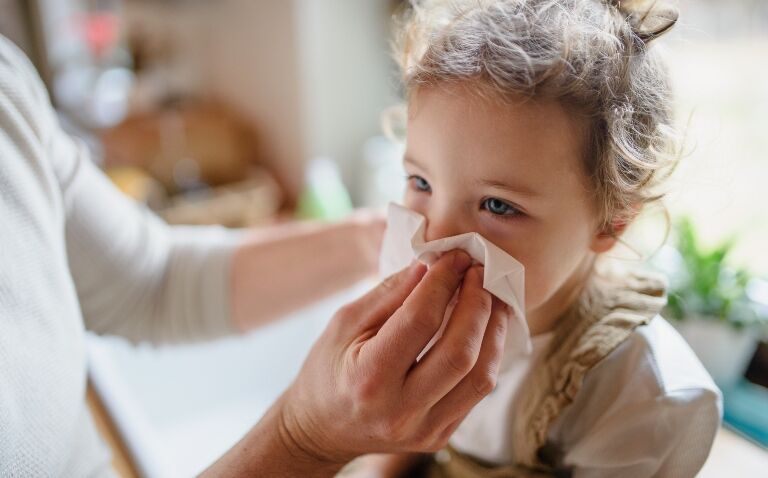Specific nasal cells found in children offer protection against Covid-19 infections and may explain why younger people typically experience milder Covid-19 symptoms than older adults, a new study has found.
Nasal epithelial cells, the primary target of SARS-CoV-2, were found to respond differently to the virus depending on a person’s age. Nasal epithelial cells collected from children quickly activated an antiviral response by increasing the production of interferons, leading to incomplete replication of the SARS-CoV-2 virus. Conversely, in older people, the antiviral response in the nasal cells was slower.
Published in the journal Nature Microbiology, the scientists from University College London (UCL) and the Wellcome Sanger Institute said the study could be ‘critical’ in developing antiviral treatment tailored to different age groups, underscoring the importance of age in both research and treatment of infectious diseases.
Despite effective vaccines, age remains the most significant risk factor for people infected with Covid-19. Research shows that infected children rarely progress to respiratory failure, whereas the risk of mortality for people over 85 years of age is as high as one in 10.
To analyse the differences in nasal epithelial cells and the behavioural responses associated with a Covid-19 infection across different age groups, the researchers recruited healthy volunteers from five large hospital sites in London between March 2020 and February 2021.
Clinicians obtained nasal brushings from participants, including children aged 0–11, adults aged 30–50, and older adults over 70. All donors tested negative for SARS-CoV-2 and had no respiratory symptoms in the preceding seven weeks.
After 28 days, the samples were infected with SARS-CoV-2 isolate hCoV-19/England/2/2020, obtained from the then Public Health England, and then incubated for 72 hours to encourage maximum viral replication.
Children were found to respond quickly to the SARS-CoV-2 virus. After three days, the paediatric cultures showed an increase in the signalling protein interferon, which can inhibit viral replication in infected cells. In cultures from older adults, the early antiviral effect became less pronounced with age.
The researchers also found increased virus production and more infectious viruses in the nasal epithelial cells of infected older adult cultures compared with paediatric cultures. Moreover, older adult samples showed increased cell shedding, thinning, leakiness and damage, which could be linked to the greater severity of disease observed in this age group.
Significant age-related differences were observed in the cellular composition of nasal epithelial cells. Single-cell RNA sequencing of 139,598 cells revealed 24 distinct epithelial cell types or states, including basal, secretory, and ciliated cells.
A higher abundance of basal cells was found in adult cultures compared to paediatric cultures, but the most notable difference between age groups was the increase in goblet cell types observed in paediatric cultures. The researchers suggest that the goblet cells may help restrict viral replication.
Co-senior author Dr Kerstin Meyer, a principal staff scientist in cellular genetics from the Wellcome Sanger Institute, said: ‘By carrying out SARS-CoV-2 infections of epithelial cells in vitro and studying the responses with single-cell sequencing, we get a much more detailed understanding of the viral infection kinetics and see big differences in the innate immune response between cell types.’
Taken together, the researchers say the findings highlight how the small changes in the cells of the upper airways can impact the development of SARS-CoV-2 infection across different age groups.
Project lead, Dr Claire Smith, associate professor at the UCL Great Ormond Street Institute of Child Health, said: ‘Our research reveals how the type of cells we have in our nose changes with age, and how this affects our ability to combat SARS-CoV-2 infection. This could be crucial in developing effective anti-viral treatments tailored to different age groups, especially for the elderly who are at higher risk of severe Covid-19.’
The researchers said that understanding the differences in nasal epithelial cells at the initiation of infection is just the beginning. They now aim to investigate the long-term implications of these cellular changes and test therapeutic interventions using their cell culture model.
In January, it was announced that 1.4 million more people in the UK, including a wider group of older adults, would be eligible for the antiviral treatment nirmatrelvir plus ritonavir (brand name Paxlovid) if they test positive for Covid-19.









